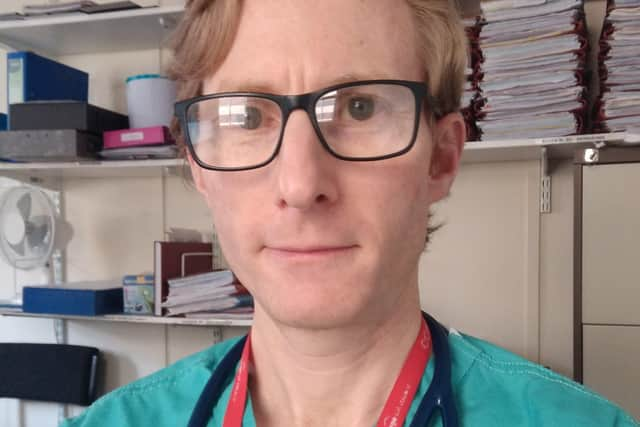Idiopathic Pulmonary Fibrosis - The incurable lung disease that claims 200 lives a year in NI


When Ballymena man Tony Devlin, 75, started experiencing shortness of breath and lack of energy back in 2015, the former fruit and veg shop owner put it down to being ‘out of condition’.
“I retired in my sixties and, I’m not saying I did a lot of physical work, but I’d been fairly active. I thought the shortness of breath was because I wasn’t doing as much exercise as I would have normally been doing,” he said.
Advertisement
Hide AdAdvertisement
Hide AdTony, a non-smoker, also developed a persistent cough, which was when he sought medical advice.


There then followed a battery of tests, the first of which was a chest X-ray.
“That turned out to be clear. We thought then it was a bit of bronchitis,” said Tony.
“Then it was thought the cough was caused by reflux, so I had a camera put down into my stomach, but it wasn’t that either. Then I had a scan and then we finished up with a bronchoscopy, where they put the camera into the lungs and that’s when Idiopathic Pulmonary Fibrosis (IPF) was confirmed.”
Advertisement
Hide AdAdvertisement
Hide AdFrom the initial onset of symptoms, Tony’s diagnosis took four years. This is not uncommon as IPF is a notoriously difficult condition to diagnose.
It is also a relatively unknown disease and when Tony was told he had IPF, he hadn’t a clue what it was.
“I had never heard of the condition. I didn’t know anything about it. When I read the booklet the doctor had given me on IPF my initial reaction was, I think they’ve made a mistake, I don’t think this is me at all, but it was me.”
Poor prognosis
IPF is a condition in which the lungs become scarred and breathing becomes increasingly difficult, making simple things like getting dressed or showering a mammoth task. It’s not clear what causes it, but it usually affects people who are in the 50-70 age bracket.
Advertisement
Hide AdAdvertisement
Hide AdBefore the availability of specific anti-fibrotic treatments like pirfenidone and nintedanib, about half of people with IPF lived at least three years from their diagnosis. Around one in five survived for more than five years. It’s hoped these figures will be improved by the availability of new treatments to slow the disease’s progression. However, there is no currently no cure for IPF, apart from a lung transplant.
Tony, who has been married to Elizabeth for 52 years and has three children and four grandchildren, is currently not on any medication, but does take oxygen when he needs it.
“I haven’t got to the stage of needing drugs. When I went on to the oxygen, I thought this is it, this is the finish and really in my case it hasn’t been, the oxygen has been a great help to me, it’s helped me to be more physically active.”
Tony said he isn’t in any pain, but the cough is bothersome and mornings can be challenging
Advertisement
Hide AdAdvertisement
Hide Ad“I was conscious of it (the cough) - and this was a pre-Covid. I could see people looking at me. There was one occasion where I was sitting beside people and they got up and moved because of it.
“I think for most IPF sufferers the cough is the biggest drawback. It can just really hamper what you do and what you feel like doing. And then put Covid along with it and you’ve got a double whammy.”
But Tony maintains a very positive attitude to his condition.
“Life is what you make of it. My life is pretty good and most of the time I am fine. I am very lucky. I have very good support. My kids are good, my wife is good, I have great neighbours, my own local GP practice is first class. I have a very good consultant and a very good nurse looking after me. I have no complaints about the NHS - they are doing what they can for me. If you were sitting opposite me you’d think there’s not much wrong with this guy. Whatever time I have left, I’m going to enjoy it.”
An estimated 1,200 sufferers in NI
Advertisement
Hide AdAdvertisement
Hide AdNorthern Ireland has the highest prevalence of IPF in the UK, with an estimated 1,200 sufferers. Despite this there is only one specialist centre in the north of Ireland, based in Antrim Area Hospital and only two consultant respiratory physicians, and a specialist nurse. This is in contrast to England where there are multiple specialist centres.
Dr Eoin Murtagh, one of the respiratory consultants at Antrim Hospital, said people are “devastated” to receive a diagnosis of IPF.
“It is very difficult news for the patient and their carer to receive. Unfortunately most patients who are diagnosed with IPF will die from the condition; they will either die directly from the disease itself or from complications of the disease. It is a terminal illness in a sense.
“It’s worse than most forms of cancer - like leukaemias and lymphomas or bowel or bladder cancer - only lung cancer and cancer of the pancreas would carry a worse prognosis. The average survival for a patient after diagnosis is two and a half to three years.”
Advertisement
Hide AdAdvertisement
Hide AdDr Murtagh said IPF tends to be a condition that presents in late middle age.
“It tends to be rarer in people younger than 50, but people in their 40s can develop it. With our population getting steadily older we are often making the diagnosis in older people, often in their 80s.
“It is more common in men and although it is not caused by smoking, about two-thirds of patients would be current smokers or ex-smokers.”
Dr Murtagh said because of the smoking link, people are often misdiagnosed with other conditions such as Chronic Obstructive Pulmonary Disease (COPD).
Advertisement
Hide AdAdvertisement
Hide Ad“People can have the two conditions at the same time, so a lot of our patients who have smoked have COPD and IPF.”
He said people would notice symptoms of breathlessness worsening over time.
“They might notice being more out of puff walking to the shops or going up the stairs. Initially they might attribute that to getting older, but then it just keeps getting worse.
“A common symptom is that 50 or 60 per cent of patients would develop a cough and it’s usually a dry cough, rather than one with phlegm. Another big symptom that people wouldn’t automatically attribute to a lung problem is fatigue, for a lot of patients they notice when they reflect back they were just feeling tired every day - that can be quite a debilitating symptom.
Advertisement
Hide AdAdvertisement
Hide Ad“Other conditions like heart conditions can give the same symptoms, so it is quite difficult for people to initially recognise that there might be something wrong and then it’s quite challenging for their GP to establish that it might be this condition rather than more common conditions.
“The data shows that people have presented multiple times to their GP before they may have been referred on to a specialist because initially there is this overlap with so many other conditions, which leads to a delay in a more accurate diagnosis.”
Medication
Dr Murtagh added: “In recent years we now have access to two anti-fibrotic drugs - we do know that these help patients with IPF live a bit longer, so on average they help a patient survive an additional two or three years.
“They are not a cure, but they can slow the disease down so it progresses more slowly than it would otherwise would.
Advertisement
Hide AdAdvertisement
Hide Ad“Unfortunately they are not available for all our patients. In the NHS our medical regulators NICE have placed restrictions so that 30 or 40 per cent of our patients with IPF are not able to have these drugs prescribed because their disease falls outside the criteria for using them (patients must have a lung capacity of 80 per cent or less before they are prescribed).
“It’s very frustrating because in other countries in the world there is no limit to access and patients are reading and looking on the internet and realise that if they lived elsewhere in Europe (including the Republic of Ireland) they would be able to have this medication or if they lived in North America they could get it.
“It’s very frustrating for us as doctors and nurses and upsetting for patients when they know these drugs could make a difference, but they can’t receive them.”
He added: “Cough is a very troublesome symptom at the moment there aren’t very many effective ways of treating cough, but there are some promising drugs on the horizon, which are in the final stages of research.”
Advertisement
Hide AdAdvertisement
Hide AdOutside of medication he said patients are managed around helping them cope with symptoms and to manage their everyday life a little bit better.
“Some patients might benefit from having oxygen to enable them to walk further or perform basic activities around the house.
“We encourage people to participate in exercise and many might take up exercise classes in their local health centre or gym and also we try to encourage patients be involved in rehabilitation classes.
“Some of our patients experience flare ups of their condition and can be vulnerable to infections as well, so it’s about educating them on what symptoms to be aware of that they can seek attention from their GP in good time to get a course of antibiotics, etc. ”
Advertisement
Hide AdAdvertisement
Hide AdLike many other conditions, Covid has had a knock-on effect on services for IPF patients.
“Patients have had their clinic appointments cancelled again and again.
“Our new patients are having to wait longer to be seen. That’s because myself and my colleagues as chest physicians are the ones on the wards looking after Covid patients, and when we are in a surge we have to postpone all our clinics.”
Support group
In 2015 the respiratory staff from Antrim Area hospital formed a support group, along with the British Lung Foundation, called The Northern Trust Pulmonary Fibrosis Support Group which has proved to be extremely helpful to many IPF patients and their carers.
Advertisement
Hide AdAdvertisement
Hide AdTony Devlin said the support group has been “invaluable” to him and he especially enjoys the Sing Strong class which helps him manage his breathing.
Ballycastle man Tom McMillan, whose wife Una was diagnosed five years ago at the age of 65 with IPF, chairs the Northern Trust Pulmonary Fibrosis Support Group.
*The Northern Trust Pulmonary Fibrosis Support Group would like people who could help in any way or who require support to log onto their website http://www.northerntrustpfsg.com or email: [email protected]
*September is the biggest month in the calendar for patients, families and APF (Action for Pulmonary Fibrosis). IPF WEEK will run from September 18-25
Comment Guidelines
National World encourages reader discussion on our stories. User feedback, insights and back-and-forth exchanges add a rich layer of context to reporting. Please review our Community Guidelines before commenting.